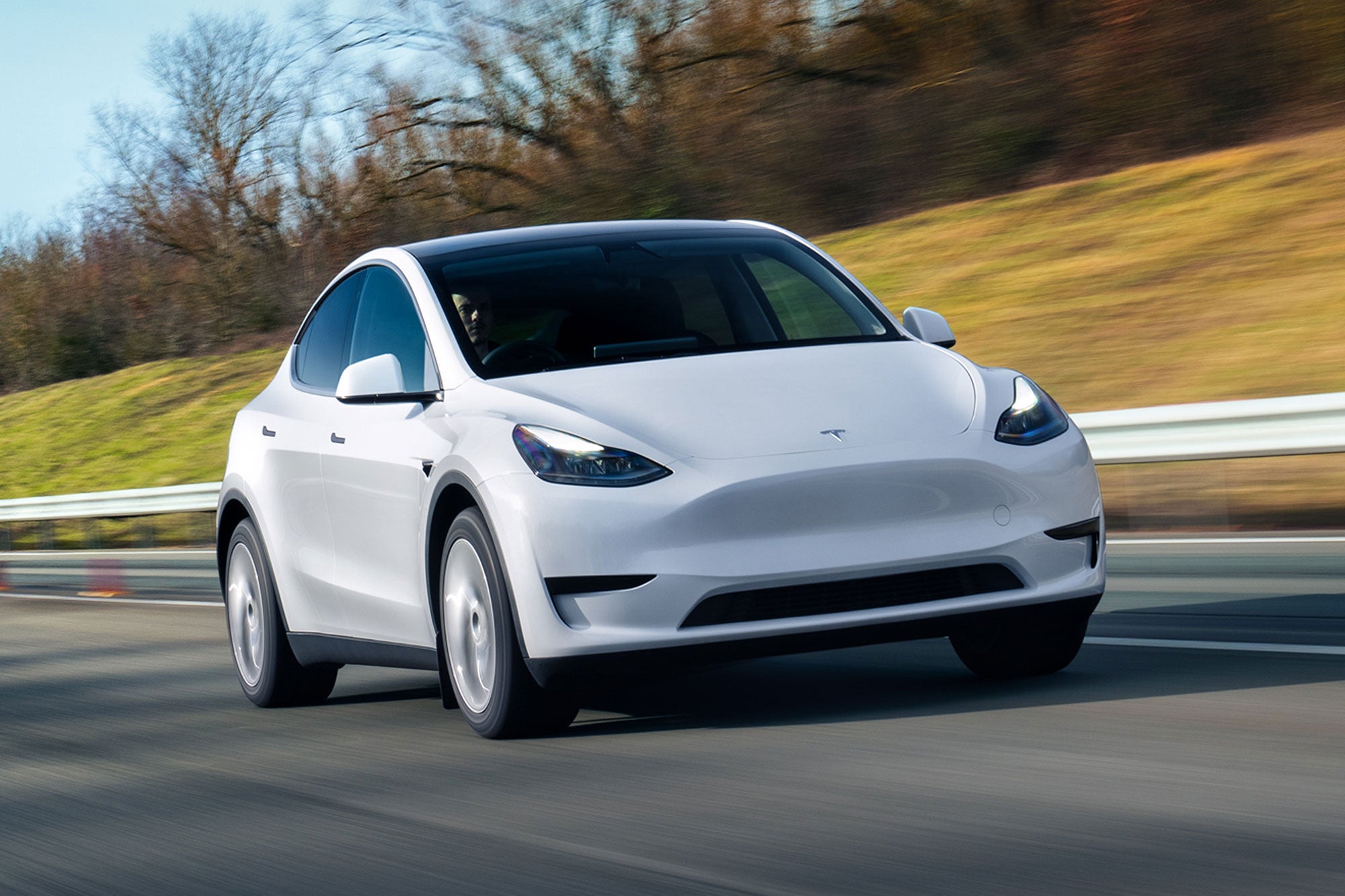Tesla Model Y Review 2025: Price, specs & boot space
Written by Richard Aucock
Quick overview
Pros
- Strong performance on all versions
- Good battery range and charging speed
- Very spacious and practical interior
Cons
- Ride quality is unforgiving
- No seven-seat option for the UK
- Dashboard is almost too minimalist
Verdict: Is the Tesla Model Y a good car?
“The Tesla Model Y has become the world’s top-selling electric vehicle, aided by strong range and impressive practicality.”
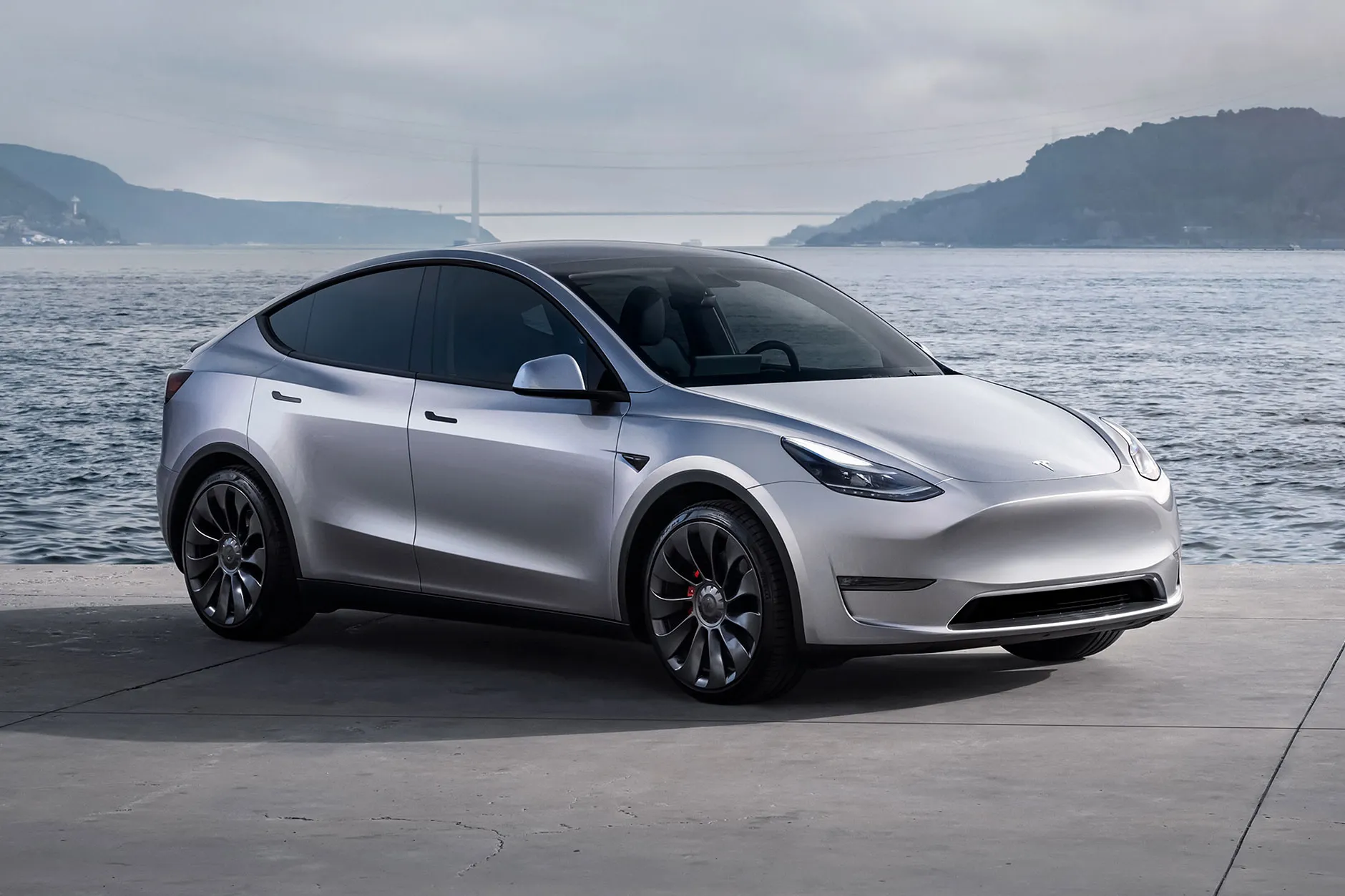
You do not become a global best-seller by chance, so the Tesla Model Y must be doing a lot of things right to prove so popular. It has certainly been a success in the UK, being the most popular electric car launched here to date. We'll find out what that is in this review, and what's been updated with the facelift that arrived at the start of 2025.
Based on the Tesla Model 3, the Model Y converts that car’s four-door saloon design into a more practical five-door SUV layout. And when we say practical, we mean the potential to haul more than 2000-litres of luggage with the rear seats folded down - that rivals some small vans for capacity.
On top of this, the Model Y boasts an officially tested battery range of up to 331 miles – and even the standard RWD version can deliver more than 280 miles. Should you really want to, the Model Y Performance can accelerate from 0-60mph in just 3.5 seconds. With the facelifted model, those numbers improve to a 311-mile range for the rear-drive model, while the Long Range versions offers up to a claimed 364 miles of driving on a full battery.
Like all Teslas, the Model Y can access the company’s own Supercharger network. This can see 150 miles of battery range added in as little as 15 minutes, making a big difference to long journeys that require charging stops.
As for the downsides? Well, the Model Y’s ride seems far too firm for a family SUV, clattering over potholes and finding ruts and bumps in roads that otherwise look smooth. Its ultra-quick steering can take some adjusting to as well.
The reliance on one central infotainment touchscreen to control almost everything can also be a pain. For instance, opening the glovebox requires using the screen, instead of just a simple button – as found in almost every other car on sale.
Familiarity does improve things with the Tesla’s infotainment system, such as learning to look down for the speedometer, but you cannot help but feel there is a better way of doing things. Rivals such as the Audi Q4 e-tron and BMW iX1 demonstrate this well.
Ultimately, both the Model Y’s ride and infotainment system are not deal-breakers in an otherwise impressive package.
With punchy performance, a usable battery range, acres of interior space and access to a dependable charging network, it is easy to see why the Tesla Model Y has been such a global success story.
Is the Tesla Model Y right for you?
Let us flip this question on its head, and ask why the Tesla Model 3 might be wrong for you. As virtually the same vehicle underneath, the Model 3 is cheaper, quicker and comes with a better battery range. But, it cannot match the practicality of the larger Model Y.
So, if you like what the Tesla Model 3 can offer, but cannot live with a traditional four-door saloon design, the Model Y will be your salvation.
With strong performance, a good electric range and access to Tesla’s Supercharger network, the Model Y really is a great choice in the family SUV sector.
What's the best Tesla Model Y to choose?
Tesla’s approach to standard specifications means you can forget worrying about trim levels when it comes to the Model Y. Regardless of the powertrain chosen, each comes with the same level of equipment throughout the line-up (other than the Performance gaining larger 21-inch alloy wheels).
It means the key choice when looking at the Model Y is deciding how much battery range and performance you really need.
With the 2025 facelift model, you have the same Rear Wheel Drive and Long Range versions to pick from. In our view, the cheaper rear-drive model is fine for most needs unless you really hate stopping to charge up. Prior to the facelift, the entry-level Model Y RWD was still plenty quick enough, and officially capable of covering more than 280 miles. If you are unlikely to require the bigger battery capacity of the Model Y Long Range or Performance versions, sticking with the cheapest option makes the most sense.
However, if you really want an electric family SUV that can accelerate from 0-60mph in 3.5 seconds, the Model Y Performance is the one for you - we've still to have this version confirmed for the facelift model but it seems inevitable. And if that rapid acceleration makes your passengers feel sick, at least its ‘vegan leather’ upholstery is wipe clean…
What other cars are similar to the Tesla Model Y?
Naturally, the Tesla Model 3 is the most similar car, sharing the same platform and powertrain as the Model Y. However, its four-door saloon design is less practical, which is likely to be the key reason for buyers picking the Model Y instead.
In terms of premium EV SUV rivals, the Model Y now has plenty to contend with. The Jaguar I-Pace was one of the first to enter this market, having since been joined by the Audi Q4 e-tron, BMW iX1, Kia EV6 and Genesis GV60. We'd also look to the Polestar 4 and Skoda Enyaq as serious threats to the Tesla.
If practical EV motoring is your thing, the Volkswagen ID.Buzz has a huge amount of interior space on offer as well.
Comfort and design: Tesla Model Y interior
“A study in minimalism, the Model Y’s cabin is devoid of almost everything except a steering wheel, two pedals and a touchscreen.”
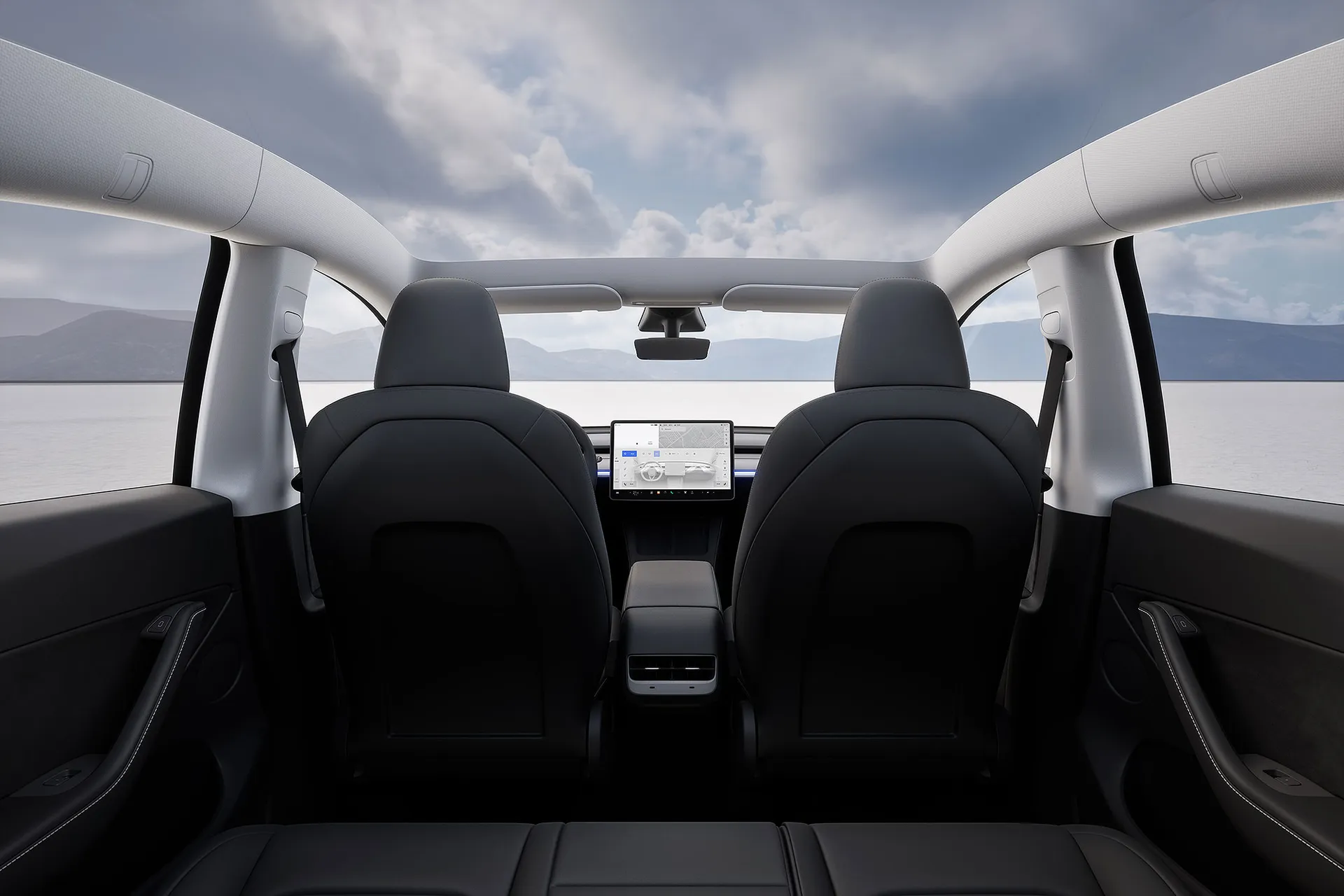
Even after many years of Teslas being on the roads, stepping inside one can still feel like a shock. The absence of virtually any physical controls is like nothing else around, and it can take some adjusting to. Thankfully, there is at least a proper indicator stalk now in facelifted models.
Compared to the Model 3, Tesla has raised the seating position inside the Model Y, meaning you look down upon the dashboard. Despite this extra height, the wide A-pillars can restrict visibility when parking or at junctions. Later versions of the Model Y also come without parking sensors, relying on a reversing camera instead.
Once you manage to adjust everything, the overall seating position is comfortable, although the front seats could be more supportive when cornering in pre-facelift cars. The facelifted model has more comfortable front seats, though they are not in the same league as a Polestar 4's chairs.
Black is the only standard colour for the upholstery, although white can be specified for an extra £1100. At least all five seats in the Model Y are heated, which can help reduce energy consumption.
Quality and finish
Interior quality has not been a Tesla strong point in the past, but the Model Y demonstrates that the American company appears to be turning a corner, especially with the facelifted version.
An Audi Q4 e-tron or BMW iX1 still feel better made, but the Model Y is showing progress in the right direction, even if some owners have reported rattles from the interior trim.
Everything in the cabin now feels built to last, though premium brands are unlikely to lose any sleep over the level of finish. The ‘vegan leather’ upholstery does not offer the same plushness as the real deal, although the suede lining on the doors is a neat touch.
Infotainment: Touchscreen, USB, sat nav and stereo in the Tesla Model Y
If you have done any research on Teslas, you will probably know that the infotainment screen is used to control almost every function within the car. This has set the trend for other manufacturers doing the same, which is either a blessing or curse, depending on your viewpoint.
A 15.4-inch (up from the pre-facelift 15.0-inch item) infotainment touchscreen is the centrepiece in the Model Y’s ultra-minimalist interior, with a responsive display and an intuitive menu system. It is used to control everything, from adjusting the steering wheel position to opening the glovebox, which can take some getting used to.
There is no separate speedometer or head-up display, meaning you have to glance down at the infotainment screen to check your speed. This becomes easier with time, but it still feels like an inelegant solution.
Services like Netflix and Disney+ can be accessed through the screen, and there are even special video games to play using the Model Y’s steering wheel – when the car is stationary, of course.
Tesla does not officially offer Apple CarPlay or Android Auto smartphone connectivity for its vehicles, taking the view that its own software is better. Members of the Tesla community have found various workarounds to make these modifications possible, however, and you can still connect your phone via Bluetooth to take calls or stream music.
Many of the Model Y’s attention-grabbing features, such as live traffic information, satellite mapping, video games and internet browsing are part of the Premium Connectivity package. This costs an extra £10 per month, which seems a bit mean on top of a new car.
With the facelifted Model Y, there is also now an 8.0-inch screen in the rear so passengers can adjust the climate control or watch films.
Space and practicality: Tesla Model Y boot space
The main reason for choosing a Tesla Model Y over the equivalent Model 3 is practicality, and there’s no doubt that the SUV version delivers here in spades. Measuring 4775mm long and 1850mm wide, the Model Y is 81mm longer and 1mm wider than a Model 3.
Space in the front of the Model Y is generous, with plenty of room for storing items throughout the cabin. A high roofline helps tall drivers fit with ease, and creates an overall sense of a bright and airy interior.
This continues through into the rear of the Model Y, which boasts more-than-sufficient headroom and legroom for a pair of adults. A third adult can be squeezed into the middle seat for shorter trips if needed, too.
In the USA and other markets, Tesla offers the Model Y with a seven-seat option. This has so far been denied to UK buyers, although the resulting third-row seats are only suitable for small children.
This leaves the Model Y’s huge boot space unencumbered, with Tesla quoting an impressive 854-litre capacity. Achieving that figure does mean filling the car all the way to the roof, however, which is different to how other car manufacturers quote boot space. Still, there is a lot of room for a relatively compact SUV, and folding the rear seats increases the total to a whopping 2000 litres.
The facelift Model Y gives up 20-litres of boot space to accommodate the electrically folding rear seats, but this is compensated for with the clever magnetic load cover that also stows under the boot floor when not needed.
There is also a 117-litre ‘frunk’ at the front of the Model Y, something many key rivals do not offer. It can be very handy for storing items like charging cables.
Handling and ride quality: What is the Tesla Model Y like to drive?
“Quick steering and an unsettled ride don’t make for a great combination, but they won’t stop the Model Y from covering ground quickly.”
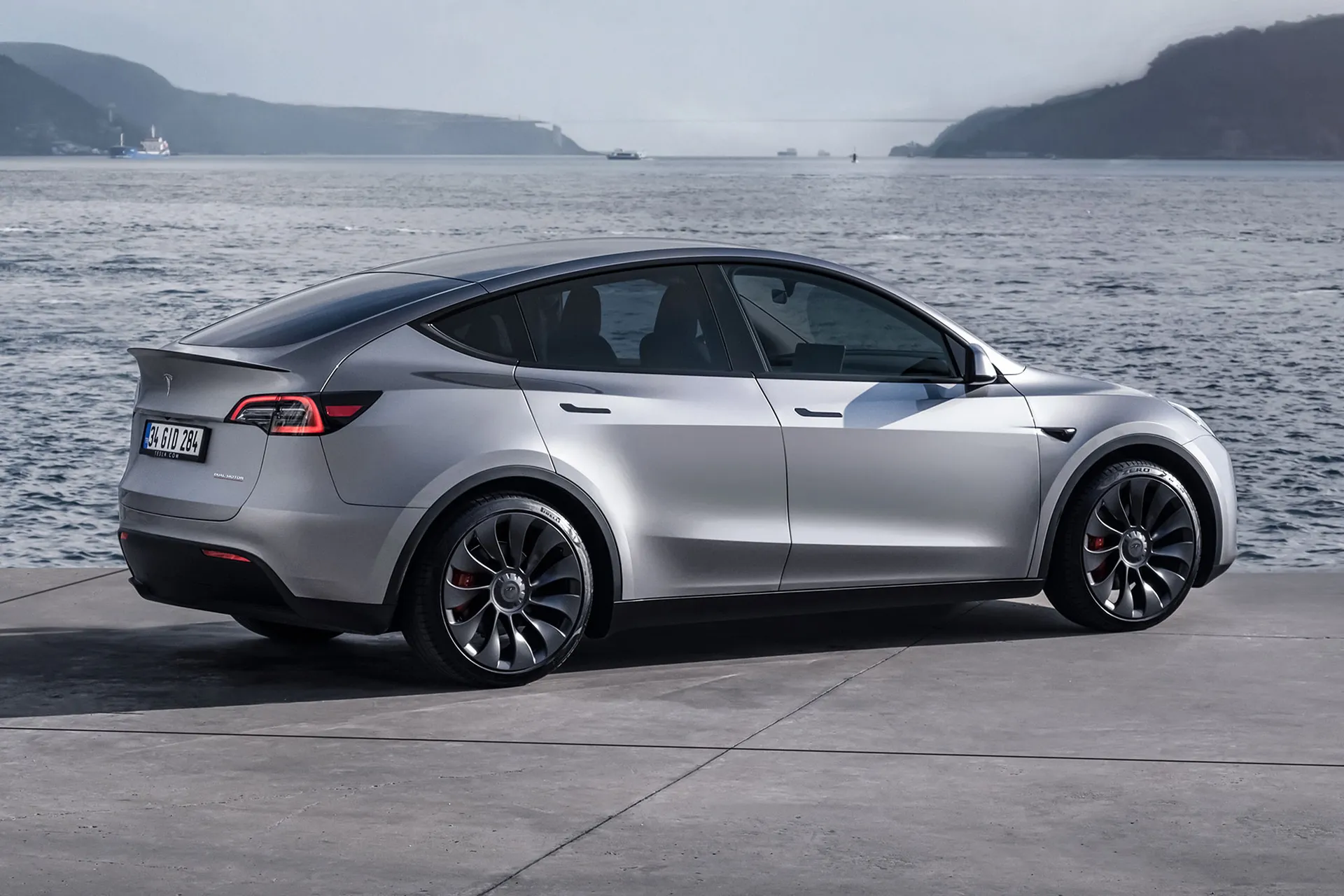
The Tesla Model 3, with which the Model Y shares many of its underpinnings, has a reputation for being a fine-handling compact electric saloon. Sadly, that has not translated into making the Model Y a paragon of SUV dynamics.
Tesla has used the same ultra-responsive steering setup as found in the Model 3, but this creates problems in the larger Model Y. The steering rack responds so fast that it can make you second-guess your inputs, adding a degree of nervousness to how the Model Y drives. There is also an artificial feeling to the feedback it generates, meaning you can never truly feel relaxed on twisting country roads.
In reality, this is not likely to bother most owners very much – and the Model Y does generate plenty of grip and resists body roll well.
The other downside is a ride quality that feels quite unyielding for a family SUV. This is the same for all versions, although the larger 21-inch wheels of the Model Y Performance naturally exacerbate the issue.
Although not a deal-breaker, there are other electric SUVs that manage to deliver a much more comfortable ride than the Model Y.
What motors and batteries are available in the Tesla Model Y?
With the facelifted Tesla Model Y, the standard Rear Wheel Drive (RWD) model has a 283PS motor that delivers 0-62mph in 5.6 seconds, which is a second quicker than its predecessor.
Choose the Long Range model and you have a choice of 311PS RWD or 380PS four-wheel drive models, the latter with twin motors. In the Long Range RWD, you can cover 0-62mph in 5.4 seconds, while the AWD version needs just 4.6 seconds for this dash.
The earlier standard Model Y RWD uses a single electric motor to accelerate the Tesla from 0-60mph in 6.6 seconds. Given the family-orientated nature of the Model Y, this is arguably sufficient performance for most needs.
Still, if you do want more, the pre-facelift Model Y Long Range has a dual-motor setup to deliver all-wheel drive capabilities. With 389PS and 510Nm of torque, the Long Range version can accelerate from 0-60mph in a hot hatchback-rivalling 4.8 seconds.
At the top of the tree is the Model Y Performance, which also comes with a dual-motor layout. Here, output from the electric motors is upped to 456PS, allowing for a scorching 3.5-second 0-60mph sprint.
All versions of the Model Y versions feel instantly responsive, and can see you reach licence-threatening speeds with alarming ease.
The level of regenerative braking can also be adjusted, including to the point of allowing the Model Y to be driven as a ‘one pedal’ EV.
Tesla Model Y range: How far can you travel on a charge?
Maximum battery range in the Tesla Model Y is dictated by which model you plump for. Choose the entry-level Model Y RWD and there is the potential for a respectable official WLTP range of 311 miles (283 miles in the pre-facelift model) via its 56kWh battery.
Next up is the suitably named Model Y Long Range, with a bigger 75kWh battery. Fully charged, this delivers an official WLTP range of 387 miles (or 331 miles in the earlier version) The AWD model drops that to 364 miles due to its twin motors..
The Model Y Performance, which is currently only available as a used model in pre-facelift form, also uses a 75kWh battery but its extra power and larger wheels result in a shorter official range of 319 miles.
Tesla cars are known for coming close to matching these tested figures in the real world, and the Model Y is no different here.
Refinement and noise levels
The lack of engine noise in an electric SUV like the Tesla Model Y can be both good and bad. There is scarcely any sound developed by the powertrain, but this does mean factors such wind and tyre noise can be more noticeable.
Having a standard huge glass roof, and no rear parcel shelf for the large load area in earlier models, means the Model Y can feel like an echo chamber inside. As a result, wind and tyre noise can feel amplified when on the motorway – making the car notably louder than an Audi Q4 e-tron, for example.
Safety equipment: How safe is the Tesla Model Y?
When it comes to safety, the Tesla Model Y can boast of having a coveted five-star rating from the Euro NCAP crash test organisation. When evaluated, the Model Y was awarded an impressive 97 percent score for adult occupant protection, along with 87 percent for child protection.
It also gained a near-perfect 98 percent score for safety assistance systems, thanks to the generous level of technology included as standard.
Alongside multiple airbags, the Model Y comes with adaptive cruise control, blind-spot monitoring and speed limit recognition, plus autonomous emergency braking and collision avoidance tech.
Charging times Tesla Model Y: How much does it cost to charge?
“Tesla’s own Supercharger network is part of the brand’s appeal, with the promise of rapid-charging with ease. Charging at home will make running costs cheaper, though.”
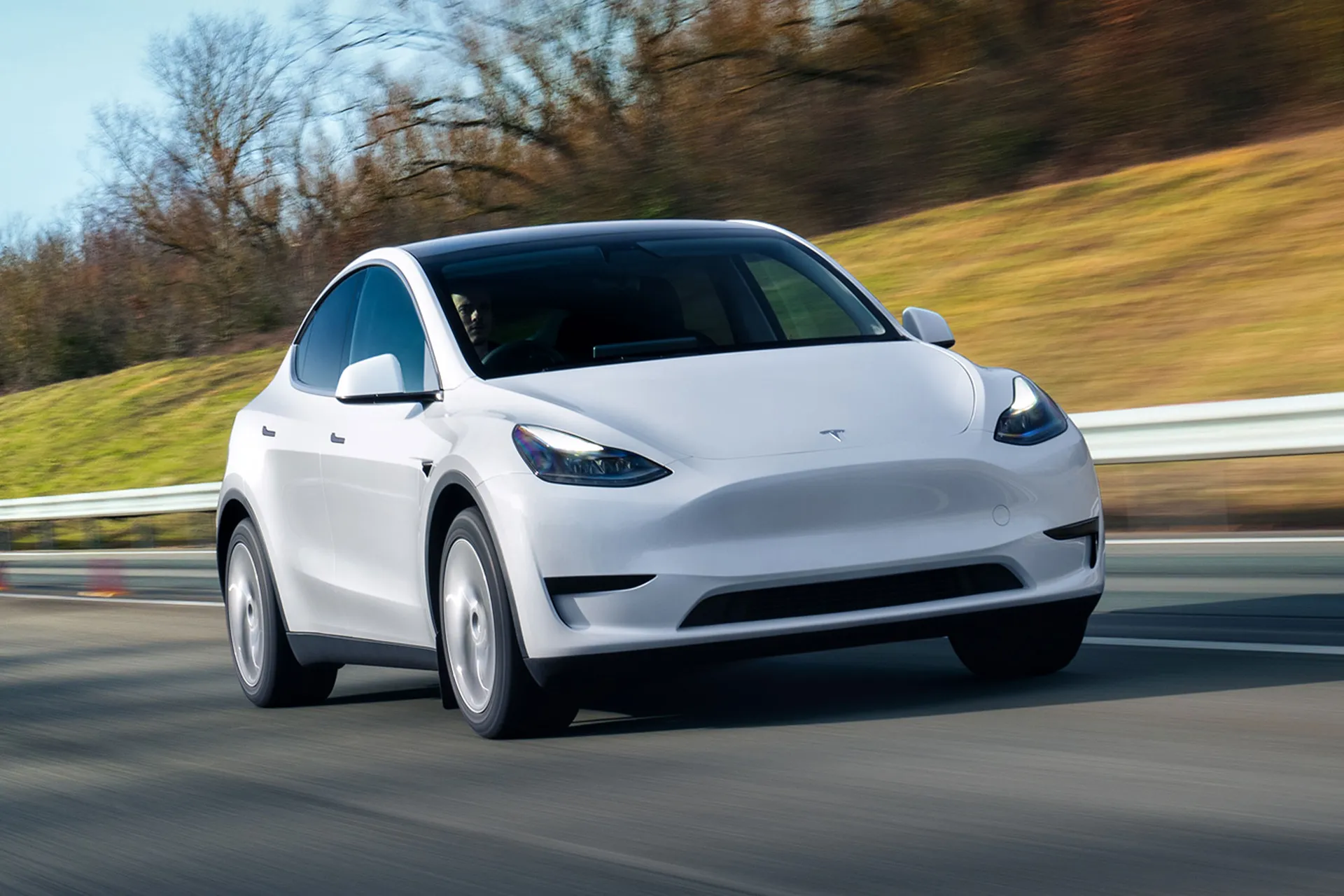
The entry-level Tesla Model Y is compatible with charging speeds of up to 175kW. Using Tesla’s own Supercharger network should see the battery boosted from 10-80 percent in around 20 minutes.
Even the Long Range and Performance models, both with a bigger battery pack, still require less than 30 minutes for the same charge.
Using Tesla’s Supercharger network does come at a cost, though. This varies according to location and averages around 50p per kWh.
Being able to use a home wallbox will reduce the cost of charging, with a 7kW device able to fully recharge the Model Y in around 12 hours.
Tesla Model Y reliability and warranty
Tesla has been subject to a number of high-profile car recalls in the United States, and has not garnered a great reputation for build quality or reliability.
However, in the latest Honest John Satisfaction Index survey, which included reliability data, Tesla took an impressive second place overall. This put the brand ahead of Porsche, Jaguar and even Toyota. The company also topped the latest reliability survey conducted by Honest John.
The Model Y comes with a four-year or 60,000-mile warranty as standard from new. A separate battery pack warranty guarantees that it should retain 70 percent charge for eight years or 120,000 miles.
Tesla Model Y insurance groups and costs
As a premium electric vehicle packed with technology, plus an almost startling level of performance, insurance costs for a Tesla Model Y are at the higher end of the scale.
The entry-level Model Y RWD is placed in insurance group 46, with the Long Range AWD version in group 48. Opting for the Model Y Performance means accepting a maximum 50 out of 50 insurance group rating, typically reserved for the fastest and fanciest of vehicles.
In truth, this is no different to rivals such as the Jaguar I-Pace, which also comes with a group 49-50 rating.
VED Lexus tax: What is the annual road tax on a Tesla Model Y?
Gone are the considerable road tax advantages of electric cars. Yes, you only pay £10 for the first year, but that then reverts to the same £195 as every other car from the second year onwards.
With Tesla's hefty prices, you will also now have to pay the £425 luxury car levy for those cars costing more than £40,000. This applied until the car passes its fifth birthday from registration.
Tesla Model Y price
“The Tesla Model Y has proved popular in the UK, so used examples can now be found for less than £25,000.”
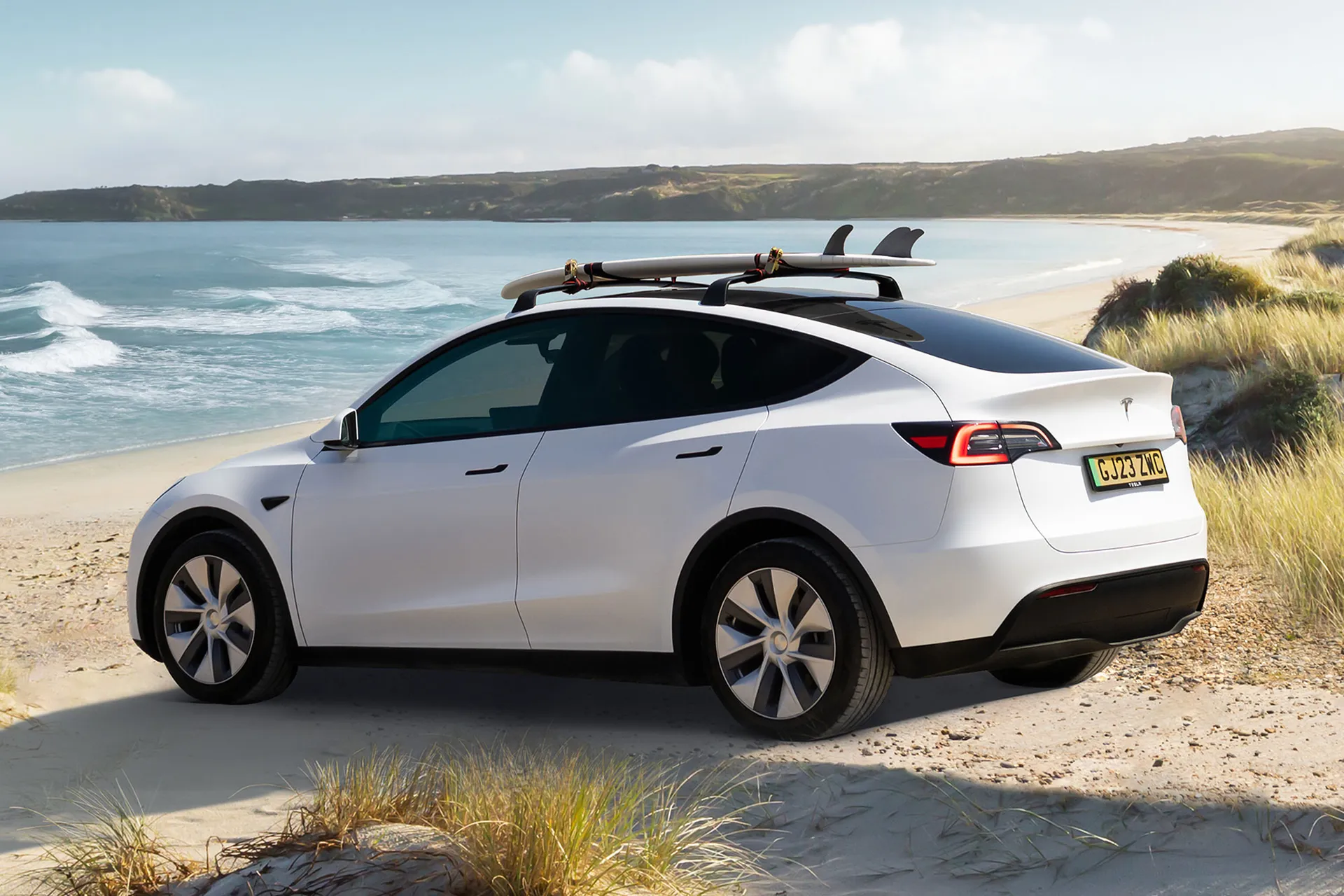
As one of the cheaper options in the Tesla range, the Model Y has attracted plenty of new buyers. And this means a good selection of cars to choose from on the used market.
An entry-level 2022 Tesla Model Y RWD could be yours for less than £25,000, with 50,000 miles showing on the odometer. Performance versions are harder to find, so bank on needing around £34,000 to secure a 2023 example of one of these.
Should you prefer a new Model Y with the facelifted looks, the Standard Range RWD model costs from £44,490. Move to the Long Range version and it's £4000 more, while the AWD Model Y begins at £51,990.
Trim levels and standard equipment
When it comes to trim levels, Tesla has made things surprisingly simple. There are no endless models to pick from, just a standard specification across the range.
This includes LED headlights with automatic main beam, LED tail lights, rain-sensing windscreen wipers, 19-inch alloy wheels, a full-length panoramic glass sunroof, an integrated dashcam and keyless entry.
Other features include black ‘vegan leather’ upholstery, 12-way adjustable front seats, heated front and rear seats, and a heated steering wheel. The dual-zone climate control features a ‘Bioweapon Defence Mode’ with a HEPA filter, while you also get a reversing camera and powered-assisted tailgate.
The 15.4-inch (15.0-inch in earlier models) central touchscreen controls almost every feature on the Model Y, among them the satellite navigation, DAB digital radio and Bluetooth connectivity. Facelifted cars have an 8.0-inch screen in the back for passengers to work the climate control. Wireless charging for two smartphones is included, along with four USB-C ports for good measure.
If you opted for the Model Y Performance, this came with a carbon fibre rear spoiler, lowered suspension, upgraded brakes and a set of 21-inch wheels.
Tesla’s Basic Autopilot adaptive cruise control comes as standard, with the option to upgrade to Enhanced Autopilot for £3800. Opting for the much-vaunted Full Self Driving setup requires £6800.
Ask the heycar experts: common questions
How long is the warranty on the Tesla Model Y?
Is the Tesla Model Y fast?
How far can the Tesla Model Y go when charged?
Get our latest advice, news and offers
Keep me updated by email with the latest advice, news and offers from heycar.
By submitting you agree to our privacy policy
